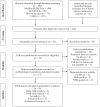Effects of dairy cow temperament on milk yield: a systematic review and meta-analysis
- PMID: 37004202
- PMCID: PMC10158527
- DOI: 10.1093/jas/skad099
Effects of dairy cow temperament on milk yield: a systematic review and meta-analysis
Abstract
The temperament of dairy cows interferes in milk yield and quality, but there is a lack of consensus throughout the literature. Thus, systematic review (SR) and meta-analysis (MA) methodologies were used to assess the effects of dairy cow temperament on milk yield. Our literature search included four electronic databases (CABI Abstracts, Web of Science, PubMed, and Scopus) and bibliographies of the publications included on MA. As inclusion criteria, we considered publications about the temperament of lactating cows and its effect on daily milk yield and total milk yield (whole lactation). A random effect-MA was carried out separately for daily milk yield and total milk yield related to each class of cows' temperament, 'low' (low reactivity, calm animals), 'intermediate' (intermediate reactivity), and 'high' (high reactivity, reactive animals). A total of eight publications reporting 75 trials were included in the analyses for daily milk yield, and three publications reporting nine trials for total milk yield. For daily and total milk yield the heterogeneity between publications was high (I2 = 99.9%). Cows of European breeds with intermediate temperament produced less milk daily than the calm (P = 0.020) and reactive ones (P < 0.001). In the case of primiparous cows, those with intermediate temperament produced less milk daily (P < 0.001) than the reactive ones, while for multiparous, the intermediate produced less than calm (P = 0.032) and reactive cows (P < 0.001). Regarding the stage of lactation, cows evaluated throughout lactation with a calm temperament tended (P = 0.081) to produce more milk than the intermediate ones, but less than the reactive ones (P < 0.001). For total milk yield, reactive cows tended to produce more than the calm (P = 0.082) and intermediate (P = 0.001) ones. Among European and primiparous cows, reactive cows produced more than the intermediate (P = 0.001). According to our results, we cannot confirm what we expected, that calmer cows would be the most productive for both daily and total yield.
Keywords: behavior; dairy cattle; performance; personality; reactivity.
Plain language summary
Individual differences in the behavior of dairy cows can affect their productive performance. In an attempt to summarize the scientific information available, we conducted a systematic review and meta-analysis to identify the effects of dairy cows’ temperament on milk yield. We hypothesize that calmer cows would produce more milk. We found nine publications with quantitative data available to be included in a meta-analysis. Eight additional publications that addressed the topic of interest but did not present data enough to be included in the meta-analysis (i.e., evaluated the relationships between temperament and milk yield using correlations or regressions) were used to perform a qualitative synthesis. The results of our meta-analysis indicated that the reactive cows were more productive than the calm or intermediate ones, contradicting our initial hypothesis. According to the results of the qualitative synthesis, most of the publications reported a negative association between reactive temperament and milk yield, indicating that calmer cows would produce more milk. We concluded that there are divergences in the information available about the temperament and production of dairy cows. We highlight the need for greater methodological and analytical standardization to allow a broader quantitative synthesis of the temperament effects on milk yield.
© The Author(s) 2023. Published by Oxford University Press on behalf of the American Society of Animal Science. All rights reserved. For permissions, please e-mail: journals.permissions@oup.com.
Conflict of interest statement
The authors have declared no conflicts of interests.
Figures

References
-
- Abdel-Hamid, S. E., Fattah D. M. A., Ghanem H. M., and Manaa E. A. A.. . 2017. Temperament during milking process and its effect on behavioral, productive traits and biochemical, parameters in Friesian dairy cows. Adv. Anim. Vet. Sci. 5:508–513. doi:10.17582/journal.aavs/2017/5.12.508.513. - DOI
-
- Bertenshaw, C., Rowlinson P., Edge H., Douglas S., and Shiel R.. . 2008. The effect of diferent degrees of ‘positive’ human–animal interaction during rearing on the welfare and subsequent production of commercial dairy heifers. Appl. Anim. Behav. Sci. 114:65–75. doi:10.1016/j.applanim.2007.12.002. - DOI
-
- Borenstein, M., Hedges L.V., J. P. T., Higgins, and Rothstein H. R.. . 2009. Introduction to Meta-analysis. John Wiley and Sons, Ltd, The Atrium: Chichester, UK.
Publication types
MeSH terms
LinkOut - more resources
Full Text Sources
Research Materials

